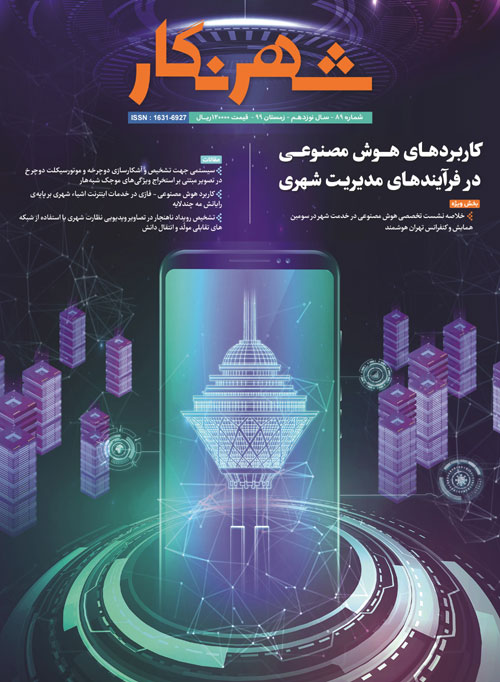فهرست مطالب

دو ماهنامه شهرنگار
پیاپی 83 (1397)
- تاریخ انتشار: 1397/03/20
- تعداد عناوین: 6
- سخن نخست
- بخش ویژه
-
گزارش کارگروه حکمروایی داده تهران هوشمند / جلسه تبادلنظر در خصوص چارچوب کلی سند«حکمروایی داده شهرداری تهران»صفحه 6
- بخش مقالات
- گزارش
-
رویداد «تهران نوآور» در حوزه خدمات مکان محور شهری / (صندوق نوآوری و شکوفائی ریاست جمهوری) تاریخ برگزاری 17تیرماه1398صفحه 42
-
Page 14
Cities around the world are struggling to move towards smart services and urban activities. Studies in developed cities indicate that the main factor of this development is understanding the requirements and prerequisites of urban data generated and collected by digital services presented to citizens. There is need for the knowledge and framework to utilize this data in Smart City in general needs further study. In this paper, a summary of the findings related to data governance studies in smart cities with different aims and perspectives is presented. In addition, the main challenges posed in the transformation of data into smart cities in different projects is reviewed. Finally, challenges raised in Tehran and considerations and possible solutions to these challenges.
Keywords: Smart City, Data, Urban Data, Data Governance, ICT -
Page 22
Nowadays, data is considered as a strategic asset for organizations and businesses. From this perspective, data governance seeks to provide an organizational framework for deploying data strategy, data goals and objectives, data policy, assigning controversial data disputes, and assigning trustees and responsibilities. They are exposed to data in order to effectively manage organizational data. In this regard, data analysis uses new tools like Business intelligence)BI(, data mining and new methods of artificial intelligence to help a better decision making resulting in good municipal management. The Center of Urban Statistics and Observation, as the guardian of data aggregation, analysis and dissemination based on the comprehensive statistical system of Tehran Municipality, tries to facilitate access to all data obtained from various municipal systems. This data is on the intranet platform for urban managers and on the internet, platform can be used by citizens.
Keywords: Big data, data gavernance, open data -
Page 34
Spatial data infrastructure is a set of technologies, policies, standards, access networks and human resources needed to collect, store, process, distribute and optimize and utilize spatial data and information. Urban managers need up-to-date and accurate information to manage Tehran’s metropolis. Tehran City Council, in 2017, approved the Integrated Tehran Spatial Information Management rule for service providers to implement the Tehran City Master Plan document with a collective effort to aggregate their information with the help of the Tehran Municipality so that Establish an integrated database of the city of Tehran And To be observers the governance of spatial data in the city of Tehran, and all service providers can take an effective step toward advancing urban management goals. This paper seeks to examine the role of SDI in data governance and also to examine it in the case study of the Integrated Spatial data in Tehran.
Keywords: Spatial data Infrastructure (SDI), Tehran Municipality, Data Governance


